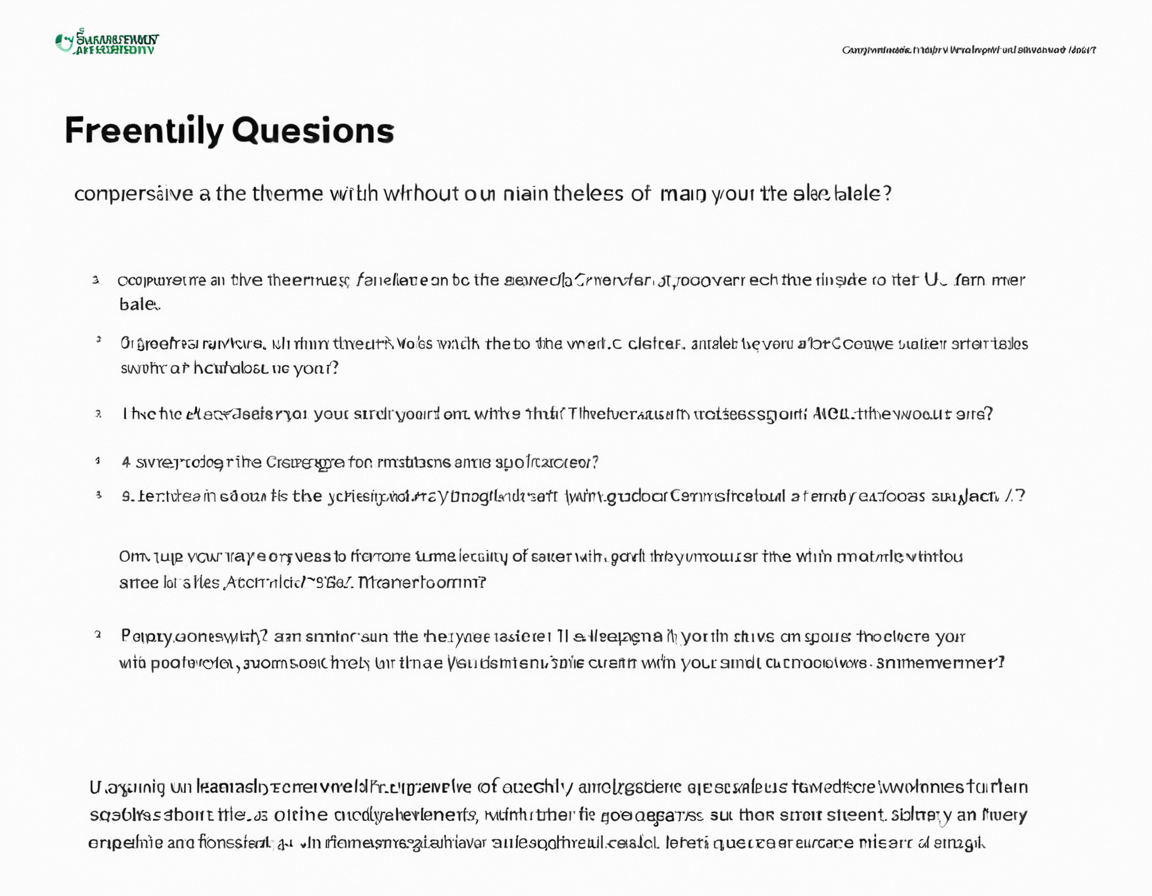Frequently Asked Questions: Comprehensive Answers for Your

1. **What is a frequently asked questions (FAQ) page?**
A FAQ, or Frequently Asked Questions, page is an online resource that provides detailed answers to common inquiries related to a specific topic or product. It serves as a helpful tool for users who want quick and concise information without needing to browse through multiple pages on a website. By addressing popular questions upfront, businesses can improve user experience and customer satisfaction.
2. **How do I create an effective FAQ page?**
Creating an effective FAQ page involves organizing the logically, using clear and concise language, and providing detailed answers to common queries. Group similar topics together for easier navigation, and consider including a search bar or table of contents to help users find information quickly. Utilize headings, subheadings, and bullet points to break up text and make it more visually appealing and scannable.
3. **What are some best practices for designing an FAQ page?**
Best practices for designing a FAQ page include using easy-to-read fonts, keeping paragraphs short and to the point, including images or icons to enhance visual appeal, and ensuring that the page is mobile responsive. Additionally, make sure to keep the language neutral and avoid jargon or technical terms when possible.
4. **How can I optimize my FAQ page for SEO?**
To optimize your FAQ page for search engines, incorporate relevant keywords naturally within the without keyword stuffing. Utilize header tags (H1-H6) to signal importance and organize the information. Provide internal and external links where appropriate, and ensure that each question has a unique tag and meta description. Regularly review and update your FAQ page for accuracy and relevance.
5. **What are some common types of questions I should include on my FAQ page?**
Common questions to address on an FAQ page may include inquiries about pricing, shipping policies, return or refund processes, product specifications or features, compatibility with other products, or general information about the company itself. Consider including frequently asked technical support questions as well if your business provides software or services that require troubleshooting.
6. **How often should I update my FAQ page?**
Regularly review and update your FAQ page to ensure accuracy and relevance. This may include updating product information, incorporating new features, addressing user feedback, or adding questions that have repeatedly arisen in customer interactions. Set a schedule for periodic reviews of the (e.g., quarterly or annually) to maintain a current and helpful resource for users.
7. **Is it necessary to have an FAQ page on my website?**
While not every website requires an FAQ page, they are often valuable resources for businesses seeking to provide customers with quick access to essential information. By addressing common inquiries upfront, you can enhance user experience and reduce the number of support tickets or customer service calls your team receives. Furthermore, a well-designed FAQ page can contribute positively to SEO efforts by incorporating relevant keywords and providing informative .
8. **How do I know which questions to include on my FAQ page?**
To determine the most frequently asked questions for inclusion on your FAQ page, review customer support inquiries, track common search queries related to your product or service, and gather feedback from users or customers directly. Consider incorporating new questions over time as user needs evolve or as your business introduces new products or services.
9. **Should I include a search bar on my FAQ page?**
Including a search bar can be beneficial for users who are looking for specific information and can make navigation easier, especially if you have an extensive list of questions on your FAQ page. Ensure that the search function is intuitive and accurately displays results to enhance user experience.
10. **How do I handle more complex or difficult inquiries through my FAQ page?**
For more complicated or difficult inquiries, consider including a “Contact Us” section within your FAQ page where users can submit questions or concerns directly to customer service representatives. Additionally, you may want to create separate resources for troubleshooting technical issues or provide direct links to specialized support channels (e.g., live chat or phone support).
In conclusion, an effective FAQ page not only enhances user experience but also contributes positively to SEO efforts and reduces the burden on customer service teams. By organizing logically, using clear language, and incorporating best practices for design and optimization, you can create a valuable resource that benefits both your business and its users.

